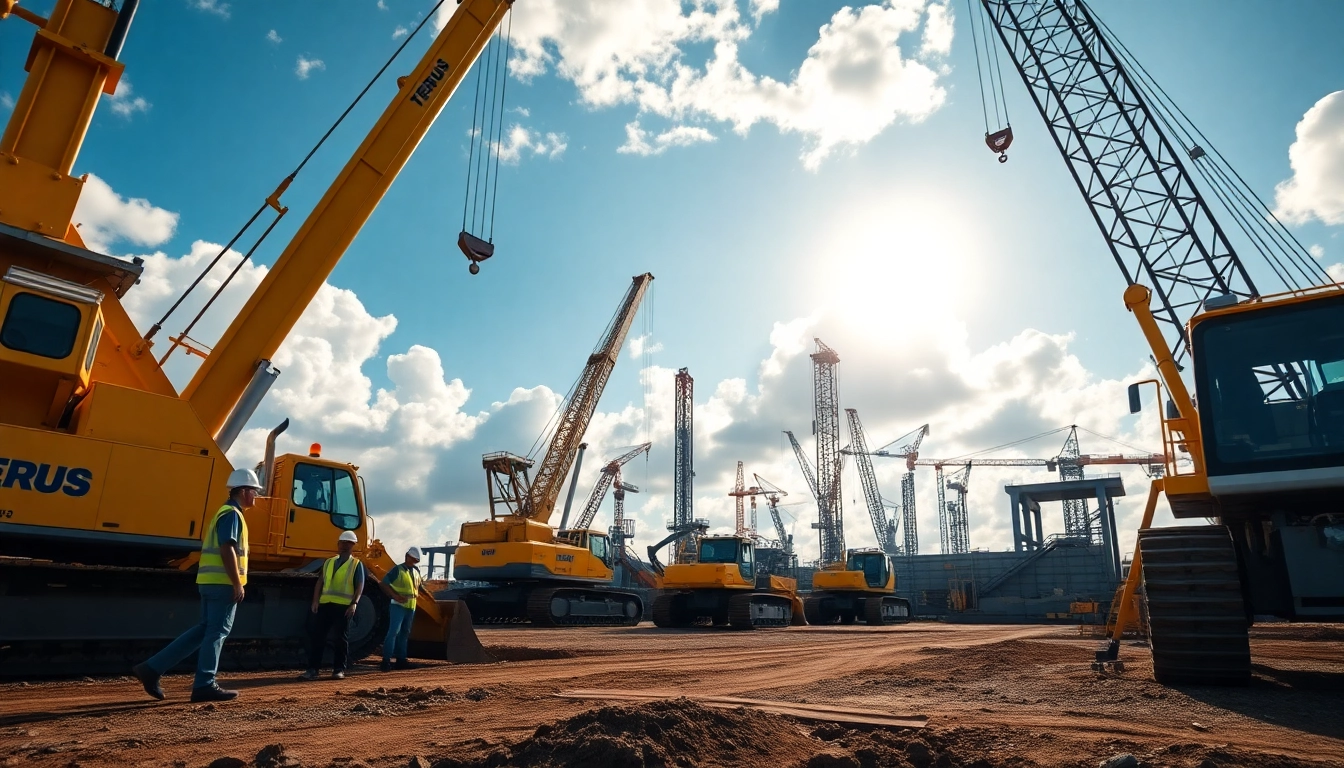Understanding the Role of a New Jersey Construction Manager
The construction industry is one of the most dynamic fields, where intricacies abound, and stakeholders’ needs must constantly be balanced. Central to navigating these complexities is the role of the New Jersey Construction Manager. This individual or firm acts as the linchpin for project success, overseeing everything from planning to execution, ensuring compliance with local regulations, and steering project teams toward effective collaboration.
Core Duties and Responsibilities
A New Jersey Construction Manager is tasked with a plethora of responsibilities that are critical for the successful completion of a project. They begin by deeply understanding project goals and specifications, often liaising with architects, clients, and subcontractors. Key duties include:
- Planning and scheduling project timelines to facilitate smooth workflow.
- Managing project budgets to align resources efficiently and minimize waste.
- Coordinating procurement of materials and negotiating contracts with suppliers.
- Monitoring construction activities to ensure adherence to designs, specifications, and timelines.
- Overseeing quality assurance to meet industry standards and client expectations.
Essential Skills for Effective Management
In order to thrive in their multifaceted role, a New Jersey Construction Manager must possess a unique blend of skills:
- Leadership: The ability to lead diverse teams and inspire confidence among workers and stakeholders.
- Communication: Clear and effective communication is critical in ensuring all parties remain informed and aligned.
- Negotiation: Strong negotiation skills are necessary to secure favorable contracts and resolve disputes.
- Problem-solving: Being able to address unexpected challenges swiftly is crucial to keeping projects on track.
- Technical expertise: A deep understanding of construction processes, materials, and regulations enhances decision-making.
Why Hiring a New Jersey Construction Manager is Critical
Hiring a qualified New Jersey Construction Manager is not merely advantageous; it is essential for ensuring project success. Their expertise contributes to more efficient project execution, mitigates risks, and helps manage complex stakeholder relationships effectively. They serve as a bridge connecting various aspects of construction, enabling smoother communication and fostering collaborative environments that lead to better outcomes.
Project Planning and Execution by New Jersey Construction Managers
Developing Comprehensive Project Plans
The foundation of any successful construction project lies in meticulous planning. New Jersey Construction Managers are adept at developing comprehensive project plans that encompass every aspect from the initial stages to project closure. This includes detailed risk assessments, resource allocations, and setting achievable project milestones. Utilizing project management tools and methodologies like Gantt charts or Agile techniques can also enhance planning processes.
Budget Management Strategies
Effective budget management is often the difference between project success and failure. A New Jersey Construction Manager must employ various strategies to keep expenditures in check. This involves:
- Creating detailed budgets that incorporate all potential costs.
- Continuously tracking expenses against the budget and making adjustments as required.
- Utilizing software for real-time budgeting updates to provide insights for quicker decision-making.
- Identifying areas for cost-saving without compromising quality or safety.
- Implementing a contingency fund to address unforeseen expenses, thus allowing the project to absorb shocks.
Timeline Coordination and Milestone Tracking
Timely project completion is often a critical expectation from clients. New Jersey Construction Managers excel at developing timelines that are realistic and achievable. They monitor progress against these timelines rigorously, employing milestone tracking to ensure that each stage of construction is completed within the designated period. Regular check-ins, adaptive schedules, and transparent reporting can enhance accountability in timeline adherence.
Compliance and Safety Regulations in New Jersey Construction
Understanding State and Local Building Codes
New Jersey has specific building codes and regulations that every construction project must adhere to. A knowledgeable New Jersey Construction Manager understands these codes thoroughly and ensures that every aspect of the construction complies with local laws. This involves staying updated with legislative changes and understanding how they influence project specifications. Proper compliance helps avoid expensive delays and legal troubles.
Implementing Safety Protocols on Site
Safety is paramount in construction. The New Jersey Construction Manager is responsible for establishing and enforcing safety protocols on-site. This includes:
- Conducting safety training for all crew members to ensure awareness of best practices.
- Implementing safety checks and risk assessments regularly to identify potential hazards.
- Ensuring that all equipment and machinery are properly maintained and inspected.
- Creating an emergency response plan that outlines procedures in the event of an accident.
Risk Management Plans for Construction Projects
Risk management is a critical aspect of construction management. New Jersey Construction Managers need to develop and implement strategies to mitigate risks throughout a project’s lifecycle. This can include analyzing potential risks at the outset and establishing contingency plans. Key elements of effective risk management include:
- Identifying risks early in the planning process, including financial, operational, and safety risks.
- Assessing the likelihood and potential impacts of each identified risk.
- Developing strategies to mitigate risks, such as alternative plans, insurance, and quality management practices.
- Regularly reviewing and adjusting risk management plans as the project evolves.
Effective Communication and Leadership as a New Jersey Construction Manager
Building Strong Relationships with Stakeholders
Effective stakeholder engagement is crucial for project success. New Jersey Construction Managers must prioritize building strong relationships with clients, contractors, and all other stakeholders. This involves regular updates, managing expectations, and establishing a feedback loop. By being accessible and transparent in communications, the Construction Manager fosters trust and collaboration, which is essential forproblem-solving during challenging phases of a project.
Team Coordination and Conflict Resolution
Construction projects often involve diverse teams, meaning that effective coordination is critical to project execution. The Construction Manager should facilitate team collaboration and encourage open communication. When conflicts arise, they are responsible for mediating and finding resolution strategies that keep the project on track while maintaining team morale. Techniques such as active listening and compromise help in mitigating disputes efficiently.
Leading Diverse Teams in Complex Projects
Diversity in teams can bring multiple perspectives to a project, enhancing creativity and problem-solving capabilities. A New Jersey Construction Manager needs to harness this potential by fostering an inclusive environment that values diverse contributions. Leadership involves recognizing individual strengths and promoting collaboration among team members. Regular team-building activities and inclusive decision-making processes can help deepen engagement across the team.
Evaluating Project Outcomes and Ongoing Development
Performance Metrics for Construction Projects
Post-project evaluation is critical to understanding the success of a construction endeavor. New Jersey Construction Managers should establish key performance indicators (KPIs) to assess various facets of project performance. Metrics might include:
- Project completion time versus planned time.
- Budget adherence and cost performance.
- Quality of workmanship according to pre-defined standards.
- Stakeholder satisfaction levels based on feedback surveys.
Gathering Feedback for Continuous Improvement
Gathering feedback plays a significant role in a New Jersey Construction Manager’s ability to improve future projects. This can be achieved through structured post-project reviews and stakeholder interviews to capture insights on all aspects of project delivery. Implementing feedback loops allows for constructive criticism and serves as a vehicle for continuous improvement, establishing a culture of learning and adaptation.
Professional Development and Certification Opportunities
As the construction industry continues to evolve, ongoing professional development is necessary for New Jersey Construction Managers to remain competitive. There are numerous certification programs and training opportunities available that enhance knowledge and skill sets, such as the Project Management Professional (PMP) certification and various safety training courses. Investing in professional development not only enhances individual capabilities but also promotes better project outcomes.















Leave a Reply